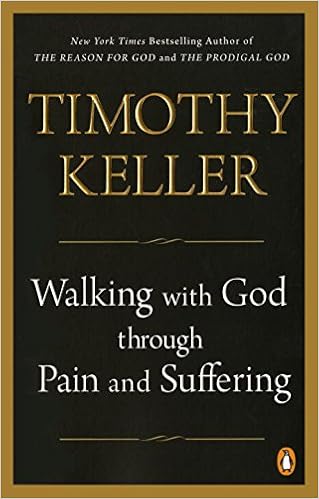 “I don’t want to believe in a God who would let this happen!” That’s the visceral argument against God.
“I don’t want to believe in a God who would let this happen!” That’s the visceral argument against God.
In Chapter 5, Keller discusses “three powerful themes of Christian teaching” that can comfort us in those deep inward feelings when we’re suffering.

First, the doctrines of creation and the fall in Genesis 1-3.
God’s creation was “very good.” But then our first parents mistrusted and disobeyed the Creator and alienated all humanity from him. When Adam and Eve turned from God everything stopped working as it should. God’s judgment against sin fell. But a world of suffering and evil isn’t what God originally intended. Death is not just a normal part of life. Keller writes, “ . . . the good pattern of the life God created here is not completely eradicated, but it now falls far short of its original intent” (p. 114).
Second, the doctrines of the final judgment and world renewal.
Many people claim they can’t believe in a God of judgment. But, if there is no judgment, what about all the injustice that’s been committed and inadequately punished, if at all? Without Judgment Day we have no hope of justice or we must take revenge.
Judgment Day is coming. But what lies beyond especially consoles sufferers. Peter van Inwagen (Professor of Philosophy at Notre Dame and Research Professor of Philosophy at Duke) writes . . .
At some point for all eternity, there will be no more unmerited suffering: this present darkness, “the age of evil,” will eventually be remembered as a brief flicker at the beginning of human history. Every evil done by the wicked to the innocent will have been avenged, and every tear will have been wiped away (p. 117).
And Keller comments, “We not only get the bodies and lives we had but the bodies and lives we wished for but had never before received. We get a glorious, perfect unimaginably rich life in a new material world” (p. 117).
C.S. Lewis wrote of suffering people who say “no future bliss” can make up for my suffering, “not knowing that Heaven, once attained, will work backwards and turn even that agony into a glory” (p. 118).
And J. R. R. Tolkien envisioned a time when “everything sad is going to come untrue” (p. 118).
Third, the doctrines of the incarnation and the atonement.
In the book of Job, Keller writes, “we have the most difficult and severe truth about suffering—namely, that in the end we cannot question God . . . God confronts Job with his own finitude, his inability to understand God’s counsels and purposes even if they were revealed, and his status as a sinner [leaves] him in no position to demand a comfortable life” (p. 119).
But the incarnation and atonement solve the severity of God’s answer to Job. Sociologist Peter Berger writes . . .
Through Christ the terrible otherness of the Yahweh of the thunderstorms [in Job] is mellowed. At the same time, because the contemplation of Christ’s suffering deepens the conviction of man’s unworthiness . . . Christ’s suffering does not justify God, but man (p. 119).
God himself came down into this dark world and bore the suffering and death for sin we earned. “He [took] the punishment upon himself so that someday he can return and end all evil without having to condemn and punish us . . . What the Muslim denounces as blasphemy the Christian holds precious: God has wounds” (Keller, p. 120,121).
True, we don’t know why God allows suffering and evil to continue, or why it’s so random. But we do know it’s not because God doesn’t love or care about us.
Even if God explained why he allows certain things to happen, our finite minds couldn’t comprehend. Keller illustrates with a three-year-old child who can’t understand the reasons her parents require certain conduct. But she can know her parents’ love and trust them. So we can know our Father’s love and trust him.
But when Jesus came, why didn’t he just destroy suffering and evil? Martin Luther’s teaching explains. He said that human nature is “curved in” on itself. “We are so instinctively and profoundly self-centered that we don’t believe we are” (Keller, p. 123).
Therefore, if Jesus came and destroyed all evil, no humans would have been left. “Jesus died on the cross in our place, taking the punishment our sins deserved, so that someday he can return to earth to end evil without destroying us all” (Keller, p. 124).
These doctrines don’t eradicate suffering. But knowing a suffering world wasn’t God’s original design, knowing that judgment and a renewed world are coming, and knowing Jesus died to fit us for that world offers us comfort when we hurt . . .
. . .until the day when we won’t, anymore.



Recent Comments